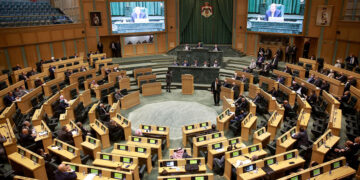Universities Expel Students for Pro-Palestine Activism; Authorities Arrest and Force Students to Pledge Not to Protest
(Washington D.C., March 22, 2024): Jordan's security forces and universities should end arrests, expulsions, harassment, and intimidation of university students for their peaceful activism for Palestinian rights and reinstate expelled or suspended students, said DAWN. Since October 7, at least nine students have been arrested and five expelled or suspended for participating in such protests.
"Students' right to free expression should be an inalienable right, not a privilege granted by the King," said DAWN's Senior Consultant Jamal Al Tahat. "While King Abdullah is loudly protesting the war in Gaza to the international community, he's not allowing Jordanians the same right to express their own views."
Since the start of the war in Gaza in October 2023, thousands of Jordanians have participated in public protests in support of Gaza. Jordanian authorities have arrested at least a thousand of these protesters and bystanders, in addition to others who have posted social media content criticizing Jordan's own policies towards Israel.
Those arrested include at least nine students from the University of Jordan, whom authorities detained for varying periods of time, releasing them only after they signed pledges not to participate in further protests. In addition, the World Islamic Sciences and Education University (WISE) and Applied Science University, both in Amman, have expelled at least five students since the war in Gaza. In December, Al al-Bayt University, located around 60 Km northeast of Amman, issued three students official warnings citing "bad behavior" in connection with their participating in pro-Palestinian protests and demanding that they stop. In February and March, DAWN interviewed four targeted students, two of whom were subject to disciplinary actions by their universities. It also interviewed a family member of a fifth student who was similarly disciplined by his university.
One University of Jordan student told DAWN on February 29, 2024 that Jordanian security forces arrested and detained for five days at least eight students from the university on December 11, 2023 for participating in and calling for pro-Palestine protests. They include Abed Al Aziz Shwayky, Osama Abu Yaghy, Khalid Sa'ed, Nour Al Taiti, Baha' Burghul, Mohamad Al Awajneh, Omar Burghul, and Mohamad Nidal. The authorities released the students after forcing them to sign pledges that they would not participate in any more protests for Palestine, according to the student.
On December 12, 2023, the Applied Science University also expelled Ahmad Haider and suspended another student, Ezz Adeen Arafah, for the academic year, because of their pro-Palestine activism, according to Haider. DAWN reviewed official letters from the University to each student, dated December 12, 2023, which refer to violations of the University's by-laws but do not specify activities by Haider or Arafah that violated them. The University's decision came days after reports that Al al-Bayt University sent formal warnings to students vaguely warning them not to engage in "bad behavior" after they participated in pro-Palestinian protests.
Haider also said that starting in November 2023, the government's Public Security Directorate's Cyber Crimes Unit filed charges against him and some of his fellow students for their social media posts criticizing the Jordanian government for its policies toward Palestine, or calling for a protest against the Jordanian goverment's facilitation of food imports into Israel. According to Haider, the authorities arrested his friends and detained them for between three and 16 days, releasing them only after they signed pledges not to publicly criticize the government or participate in further protests. Human Rights Watch reported on February 6, 2024 that Jordanian authorities have used the Cybercrime Law against other peaceful protesters as well.
In addition, according to anonymous source DAWN interviewed on March 5, 2024, WISE also expelled three students, Osama Al Jahni, Khalil Nabelsieh, and Mohamad Hmaidat, on January 23, 2024, after a hearing by the university's disciplinary council on January 15, 2024, without the presence of student representatives. The University accused the students of attacking the University's security personnel. However, a Facebook video of the protest reviewed by DAWN shows men who appear to be security personnel physically intervening with students to end a campus prayer gathering for Gaza that included dozens of students.
Jordan has 10 public and 17 private universities, in addition to the semi-public WISE, with a total number 236,000 students, 28,000 of them non-Jordanian. Universities are required under Article 14 of the Jordanian Universities Law 18/2018 to allocate two university council seats to student representatives. The last student council election in any Jordanian university permitted to take place was in the academic year 2018-2019. In 2020 and 2021, no elections were held due to COVID restrictions. In 2022, the government tasked the Higher Council of Education with amending the bylaws of university student unions and councils, which it has still not done. But since then, the Council has justified suspending student elections on the basis of the need to amend the by-laws first.
Jordan's King Abdullah exerts significant influence over Jordanian universities. According to Article 9 of the Jordanian Universities Law (18/2018), the king appoints the Board of Trustees of both public and private universities, the former as per the nomination of the government, and the latter as per the nomination of the private university's owners committee. The Board of Trustees in turn can fire the university president. In the case of the semi-public WISE, the university is chaired by the King's cousin, Prince Ghazi bin Muhammad.
Articles 15, 16, and 17 of Jordan's constitution, which was adopted in 1952, safeguard freedoms of expression, association, and assembly, but the government fails to respect these rights. The Public Gathering Law, which was amended in 2011, allows peaceful assembly without prior government approval, but the Interior Ministry and the General Intelligence Directorate continue to request organizers of gatherings to obtain permission. Jordanian authorities also have enacted laws that restrict freedoms, such as the Cybercrime Law and the Crime Prevention Law, which enable governors and the police to arbitrarily detain and punish those who practice these rights.
DAWN calls on the Jordanian authorities to end the campaign of harassment, intimidation, and arrests of peaceful protestors. It also calls on Jordanian universities to reinstate the expelled students and to stop threatening students with disciplinary actions and expulsions for their peaceful expression.





































